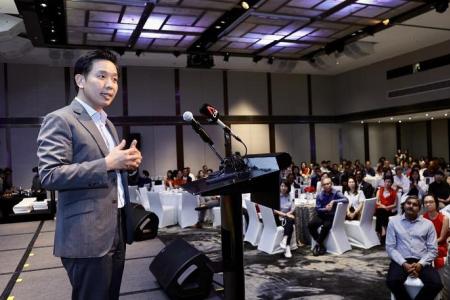$1m fund to help S'pore co-ops deepen community efforts
Co-operatives aiming to roll out or expand community initiatives for vulnerable communities will be able to tap a $1 million fund from early 2025 to defray costs.
Called the Empowering Communities Fund, it is being set up by the Singapore National Co-operative Federation (SNCF) and the Registry of Co-operative Societies with financing in equal parts from the co-op movement and the Government.
It will co-fund part of the costs co-ops bear for those ground-up initiatives, but further details are still being worked out.
Minister of State for Culture, Community and Youth Alvin Tan unveiled the fund at the third Co-operative Movement Night held on Aug 16 at the Singapore Marriott Tang Plaza Hotel in Orchard.
The annual event celebrates the successes of the co-operative movement – there are now 77 co-ops in Singapore – and recognises member contributions.
Mr Tan, who is also Minister of State for Trade and Industry, told around 300 co-op members and other guests that co-ops play a key role in Singapore, adding: “They help to strengthen our nation’s fabric when it was still a nascent nation and also (by) serving the underserved.”
He noted that the sort of projects the fund could support include basic health screenings at void decks or making recreational spaces more accessible for those with mobility challenges.
Mr Tan also said the Government will do more to support co-ops in the areas of governance, sustainability and helping vulnerable communities. One way it will do this is to introduce an induction guide for key co-op officers that co-ops can adapt for their own use.
Mr Tan noted that 19 co-ops have taken up a grant to help them become more sustainable since the scheme was launched at 2023’s Co-operative Movement Night.
On Aug 16, tokens of appreciation were handed out to 48 leaders from 24 different co-ops for their contributions to the movement and wider community.
One of the leaders was Mr Yeo Chun Fing, 67, who has been involved in the co-op movement for more than 30 years since being appointed a union leader with the Amalgamated Union of Public Employees (AUPE).
The AUPE Credit Co-operative (ACC), which Mr Yeo now chairs, was initially set up to encourage saving among public servants and to provide loans.
The co-op, which serves workers who are members of the National Trades Union Congress, has around 15,000 members. It held total assets of over $148 million as at March 31, 2023.
Mr Yeo said the co-op was created in 1965 to fill a niche that was not served, by providing loans to public servants, who faced restrictions with borrowing from moneylenders.
He said it has evolved with the times to meet the needs of members according to its strengths.
He said the ACC has prudently expanded its reach by allowing members who have retired to stay on as associate members, and for their family members to come on board too.
While there is increasing competition from other entities like banks in the services that the ACC provides, “we are the reason some entities have to compete on our terms”, Mr Yeo noted.
Another co-op leader who received a token at the Aug 16 event was Mr Vincent Ng, who served until 2023 as general manager of A Good Space, a co-op set up in 2020 as the successor to a government-funded community initiative of the same name.
Mr Ng, 32, said there is untapped potential for youth involvement in the co-op movement, citing his experience on a four-month work practicum to study the co-op scene in the United States.
For instance, heritage businesses with no succession plan in place could be restructured into co-operatives that young people could play a role in.
Co-ops could also be a viable structure for charities to invest in their low-income beneficiaries, rather than just providing financial assistance.
Mr Ng also said co-ops could “change the conversation that business is extractive”.
SNCF chief executive Ang Hin Kee said the initiatives the fund covers should be premised upon building the capacity to be self-reliant among beneficiaries.
He also said co-ops could possibly gain a foothold in other sectors, including urban farming as well as social services for caregivers and gig workers.
Mr Ang added that co-ops do not necessarily need to pursue scale – it depends on the social mission they have set for themselves, which could well be catering to a small group in need.
Get The New Paper on your phone with the free TNP app. Download from the Apple App Store or Google Play Store now


